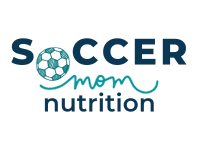What to Eat Before Soccer Practice: Fueling for the Field
Have you’ve been trying to figure out what to eat before soccer practice because you don’t like having low energy, but you also hate feeling too full when you step on the pitch or field?
I get it. But, there’s no one size fits all when it comes to a soccer player diet.
I’ve got simple tips for eating before soccer practice, that have helped many of the athletes I’ve worked with, including my own kids, figure out what works best for them.
Keep reading for my dietitian recommended high energy foods packed full of carbs to get you fueled and ready for your next soccer training. And I’ve also got some tips for timing your foods to take your fueling to the next level.
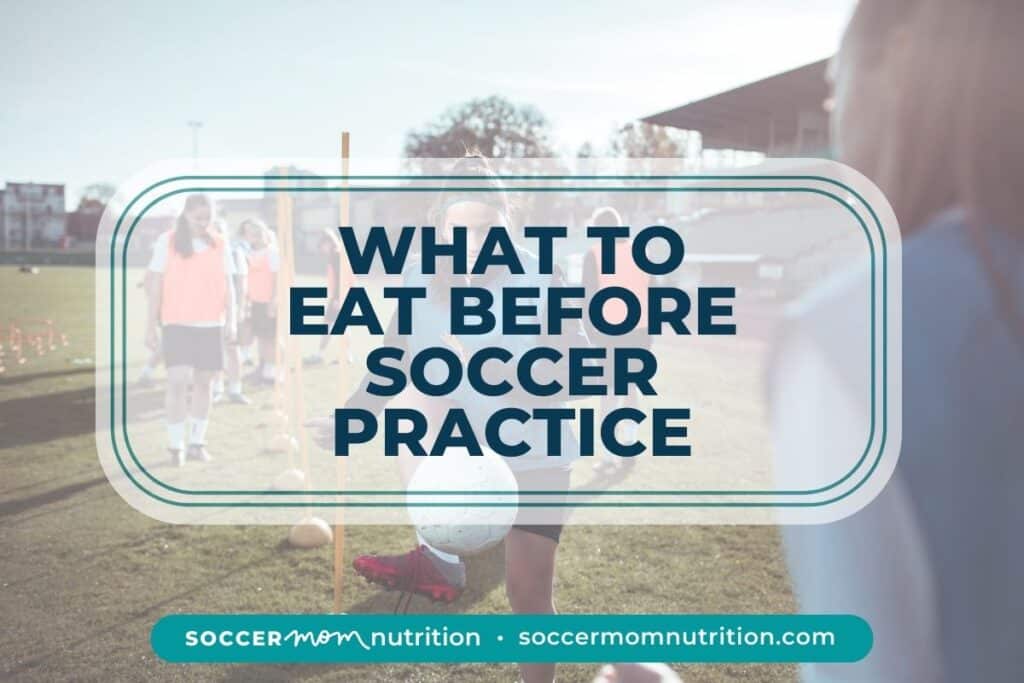
What to eat 1 hour before soccer practice
I usually recommend easy to digest carbs between 30-60 grams when you’re an hour out from a training. It’s key to pick something you know won’t upset your stomach. And enough food so you’ll be energetic and powerful on the field.
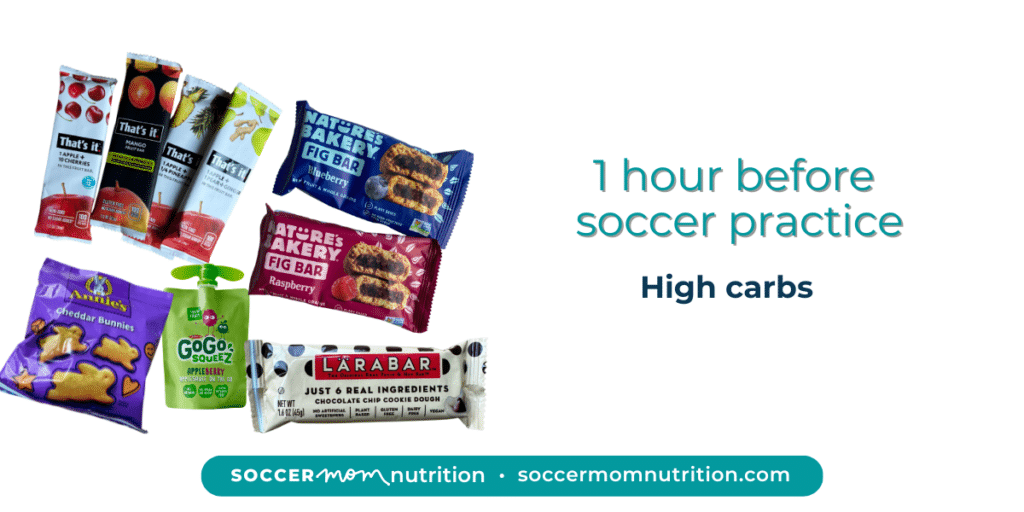
Here are some of my dietitian recommended snack choices to eat before soccer practice that are between 30-60 grams:
- Granola bars
- Pretzels
- Animal crackers
- Grapes
- Fig bars
- Goldfish crackers
- Dried fruit
- Watermelon
- Bananas
- Sports drinks
- Applesauce
- Orange slices
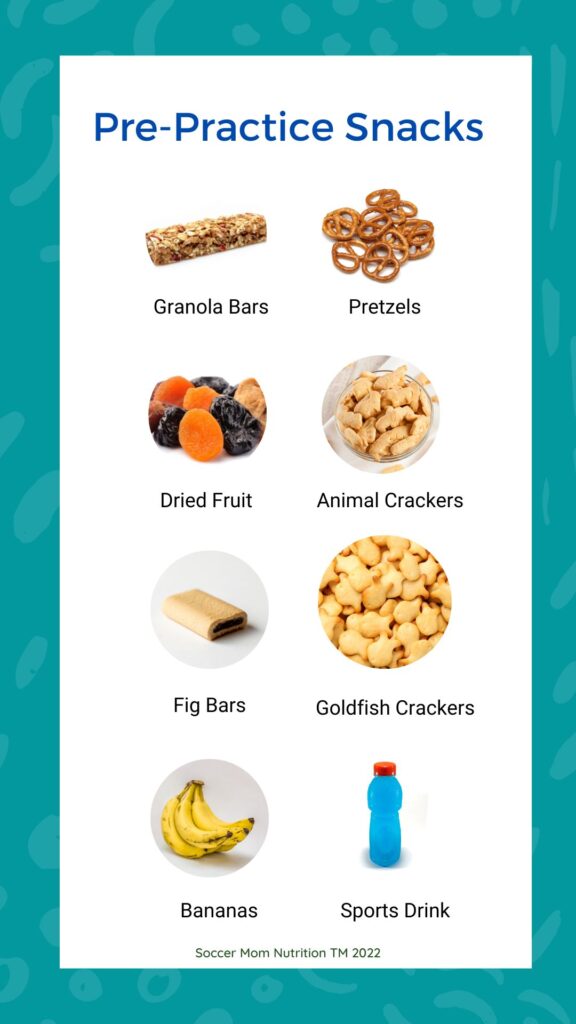
What to eat 2-3 hours before soccer practice
When you have 2-3 hours to eat before practice, I typically have soccer players pick slightly smaller portions and choose high carbs. And it’s time to reduce the fiber and protein content so you can digest the meal before your practice starts.
Here are my favorite pre-practice foods 2-3 hours out:
| Cereal/yogurt or milk/banana |
| Bagel/Bread peanut butter and jelly sandwich |
| Apple slices and peanut butter |
| Protein and carbohydrate energy bar |
| Hummus, crackers and veggies |
| Sports drink (if you’re too nervous to eat) |
| Oatmeal/milk/berries |
| Toaster waffles/pancakes with jelly and/or peanut butter/banana |
| Baked or roasted potatoes with easily digested toppings |
| Fruit smoothie/acai bowl |
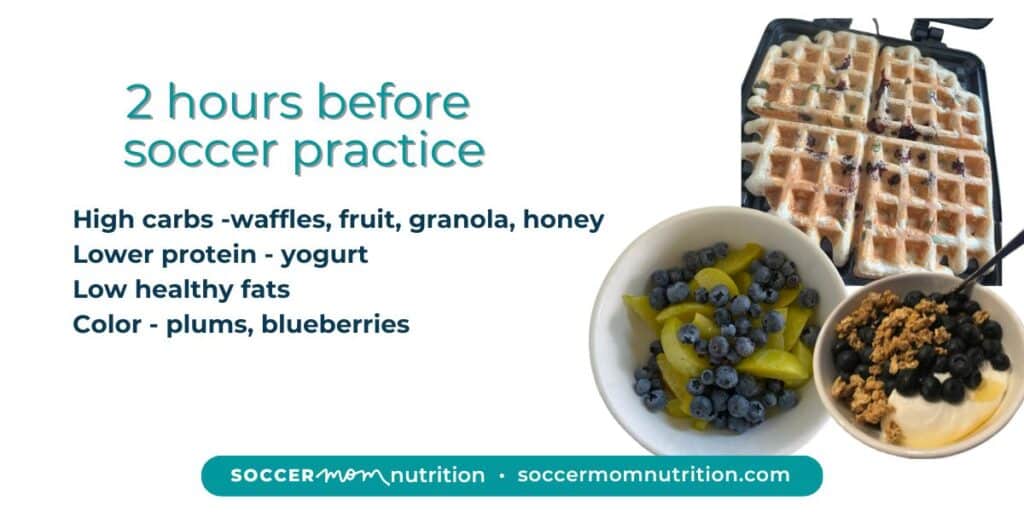
What to eat 3-4 hours before soccer practice
When you have 3-4 hours to eat before practice, choose meals with complex carbs, moderate protein and healthy fats. Since you’ll have more time to digest, you can eat a larger meal before soccer practice.
I still recommend eating foods that aren’t too heavy and sit in your gut. Practices (and rest days) are good times to test new foods or larger amounts of foods.
My recommendations for easy pre soccer practice meals include:
| Whole grain waffles or pancakes/syrup or jam/fruit/plant based sausage/walnuts |
| French toast/fruit/syrup or jam, scrambled eggs |
| Omelet with vegetables/toast/fruit |
| Grilled chicken/rice/fruit or veg |
| Turkey sandwich on whole grain bread/crackers or baked chips/carrots |
| Spaghetti with lean meat/fruit or veg |
| Burrito/bowl with lean meat or beans/rice/salsa/light on cheese, sour cream and guac |
| Baked potato/veggies/lean meat toppings/light on cheese |
| Thick crust cheese and veggie pizza |
| Energy bar/sports drink (if you’re on the go) |
| Smoothie/protein powder |
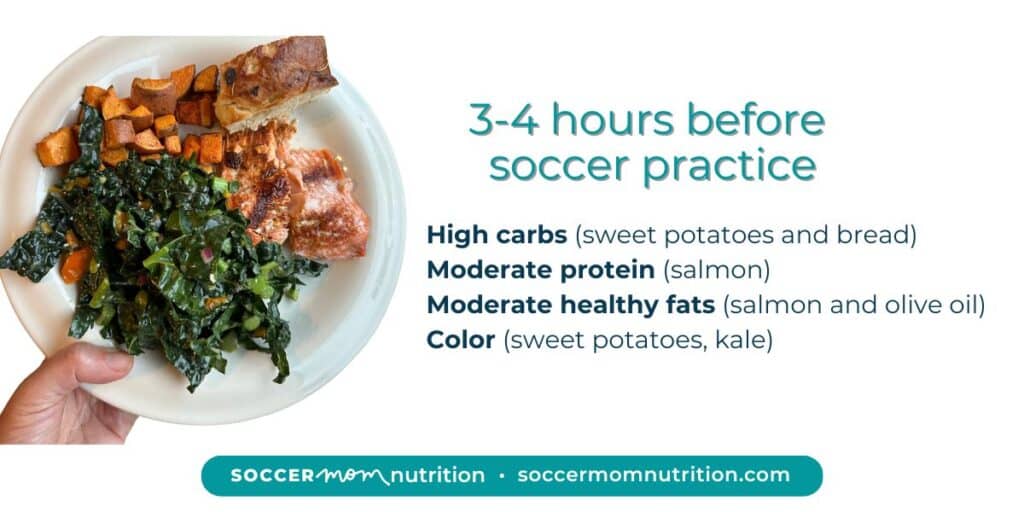
What should I eat before morning soccer practice?
If soccer practice starts too early in the morning it’s not practical to eat a large regular meal. Instead, I recommend players eat larger high carb meals the the night before, and a good bedtime snack.
Then, in the morning eat a light meal or snack between 300-500 calories. Some of the favorites at our house include whole grain toast, oatmeal, cereal, yogurt, fig bars, granola bars, smoothie, or banana.
Aside from their easy digestibility, these snacks are easy to take on the go and you can eat them in the car on your way to practice. We’ve had many early morning breakfasts in the car on the way to activities!
Experiment with a combination of quick digesting carbohydrates or one of your favorite sports drinks to see what works best for you, especially if you have a hard time eating right before soccer practice.
Check out my post on the best breakfast to eat before a soccer game for more ideas.
What to eat before afternoon and evening practice
For soccer practices in the afternoon or evening, you can eat hearty breakfast and lunches. Have meals higher in complex carbohydrate that also include moderate protein and moderate healthy fats, along with fruits and vegetables.
As you get closer to practice time in the afternoon, reduce the amount of food and protein and fiber, and instead eat more easily digestible carbs like those I recommended above for practice snacks 1-2 hours out.
You may want to have a high carb snack available to eat before soccer practice to top off your fuel stores.
What should you avoid eating before practice?
Before practice you shouldn’t eat foods that take a long time to digest. And also limit those foods that may cause heartburn, gas, bloating, nausea or vomiting. This includes foods high in fiber, fried foods and foods with fatty sauces.
You also may want to avoid carbonated beverages that can cause bloating and gas.
Timing for pre practice fueling
When it comest to timing your pre-training fueling, you want to eat enough food so you have energy at practice, but not too much that you have an upset stomach.
I find that every player is different so you have to find the right amount of food that works for you. Sometimes it takes some trial and error.
The ideal pre practice meal should be eaten 3-4 hours before practice and should be high in carbohydrate, moderate in protein and low in fat.
Check out our carb calculator to make sure you’re eating enough carbs to fuel your activity.
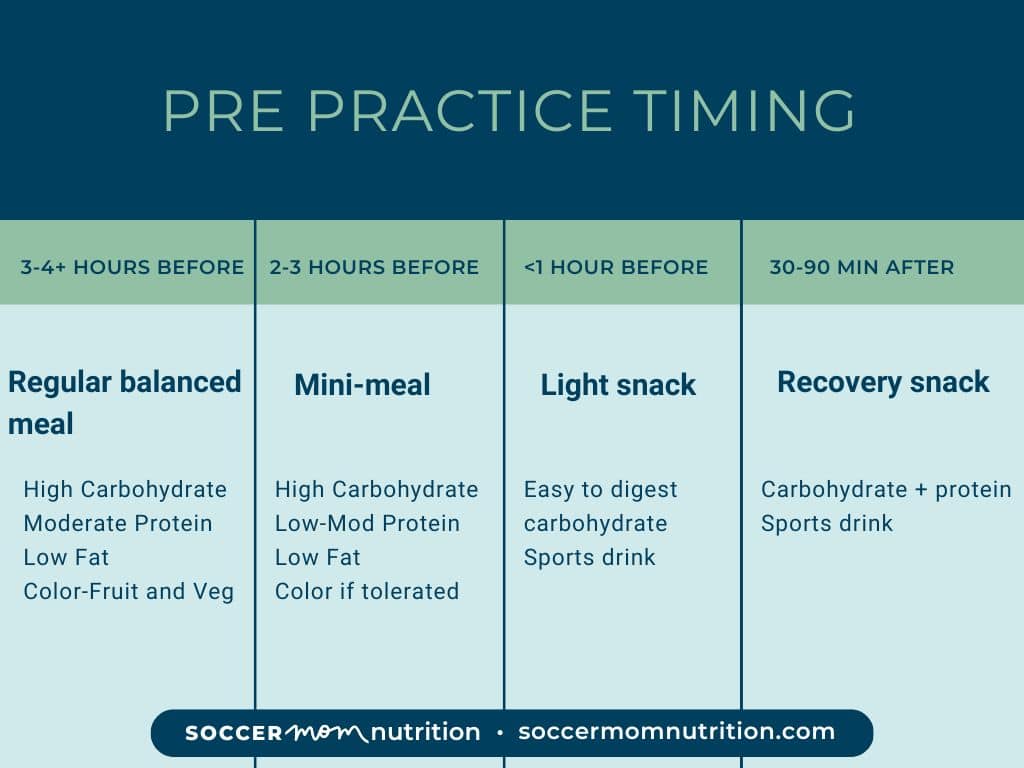
Final thoughts
High performance in soccer requires the right fueling. Right before practices and training choose primarily carbohydrates. Since they are easily digestible, carbohydrates become a ready source of energy when you need it on the pitch.
Pay attention to timing of meals and the amount of food you’re eating as you get closer to practice. You want to have enough energy to feel focused, light and energetic.
Use practices to experiment with different foods and timing so that you’ll be locked in and ready for game day nutrition.
Check out our blog post on post game and post soccer training for ideas on how to recover.
Don’t forget about developing your optimal hydration plan as well. Highly successful soccer players are adequately fueled and hydrated.
Join our mailing list and get our FREE Pre-Activity Fueling Guide.
Stephanie Magill, MS, RD, CD, FAND has over 22 years of experience in public health and nutrition. As a performance registered dietitian nutritionist, Stephanie specializes in sports nutrition and provides simple and actionable information so that athletes can be well fueled for high performance on and off the field. Stephanie has a Master’s Degree in Nutrition and is a Fellow of the Academy of Nutrition and Dietetics.
